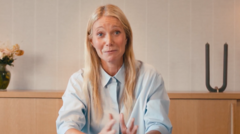Women suffering from polycystic ovary syndrome (PCOS) are increasingly targeted by influencers offering unproven tests and supplements, further complicating their journey to effective treatment.
The Dangers of Misinformation: Influencers Exploit Women with PCOS

The Dangers of Misinformation: Influencers Exploit Women with PCOS
A troubling trend emerges as unqualified influencers sell dubious remedies for a chronic condition affecting millions.
With the rise of social media, unqualified influencers are targeting vulnerable women with polycystic ovary syndrome (PCOS), selling false hope in the form of questionable tests and supplements. Sophie, diagnosed with PCOS, turned to Kourtney Simmang after struggling for years with painful symptoms. Kourtney, who is not a medical professional, marketed an expensive program promising to address the "root cause" of PCOS—a cause that remains unidentified by researchers. After a year of following Kourtney's advice without improvement, Sophie felt disillusioned and regretted her choice.
Challenging the authority of healthcare professionals, many influencers with large followings portray themselves as experts in women's health and nutrition. A BBC investigation found that half of the most popular content featuring PCOS on platforms like TikTok contained misleading claims. Common assertions include that dietary supplements or specific diets can cure PCOS, or that birth control exacerbates the condition—all of which are unsupported by scientific evidence.
Despite the World Health Organization estimating that up to 70% of women with PCOS are undiagnosed, the medical community warns that misinformation could hinder patients from pursuing legitimate treatments. Notably, Dr. Jen Gunter, a gynecologist, stated that these influencers exploit the void in accessible medical solutions, leading women to perceive themselves helpless when valid medical options are dismissed.
The appeal of influencers such as Tallene Hacatoryan—a registered dietician who promotes her own supplements—additionally complicates the health landscape. Followers are discouraged from pursuing prescribed medical options while being encouraged to focus on drastic diets that could worsen their symptoms. Amy, a Northern Irish women with PCOS, echoed similar sentiments, revealing that strict dietary regimens promoted by influencers have affected her well-being and self-image.
With ongoing stigma surrounding PCOS—particularly in regions like Nigeria where medical student Medlyn strives to educate others—there is hope that awareness and informed discussions can counter the negative narratives often propagated by social media. Medical professionals recommend that women seek specialized care from endocrinologists or gynecologists to navigate their condition effectively.
The journey to understanding and managing PCOS can be challenging; however, thanks to continued advocacy from informed individuals and communities, there’s encouragement for those affected. Sophie continues to work with her healthcare providers in search of effective treatments, reminding us that education and professional guidance are critical in combatting the dangerous lure of influencer-driven misinformation.
Challenging the authority of healthcare professionals, many influencers with large followings portray themselves as experts in women's health and nutrition. A BBC investigation found that half of the most popular content featuring PCOS on platforms like TikTok contained misleading claims. Common assertions include that dietary supplements or specific diets can cure PCOS, or that birth control exacerbates the condition—all of which are unsupported by scientific evidence.
Despite the World Health Organization estimating that up to 70% of women with PCOS are undiagnosed, the medical community warns that misinformation could hinder patients from pursuing legitimate treatments. Notably, Dr. Jen Gunter, a gynecologist, stated that these influencers exploit the void in accessible medical solutions, leading women to perceive themselves helpless when valid medical options are dismissed.
The appeal of influencers such as Tallene Hacatoryan—a registered dietician who promotes her own supplements—additionally complicates the health landscape. Followers are discouraged from pursuing prescribed medical options while being encouraged to focus on drastic diets that could worsen their symptoms. Amy, a Northern Irish women with PCOS, echoed similar sentiments, revealing that strict dietary regimens promoted by influencers have affected her well-being and self-image.
With ongoing stigma surrounding PCOS—particularly in regions like Nigeria where medical student Medlyn strives to educate others—there is hope that awareness and informed discussions can counter the negative narratives often propagated by social media. Medical professionals recommend that women seek specialized care from endocrinologists or gynecologists to navigate their condition effectively.
The journey to understanding and managing PCOS can be challenging; however, thanks to continued advocacy from informed individuals and communities, there’s encouragement for those affected. Sophie continues to work with her healthcare providers in search of effective treatments, reminding us that education and professional guidance are critical in combatting the dangerous lure of influencer-driven misinformation.


















